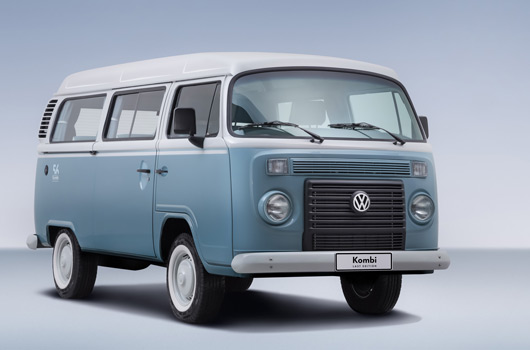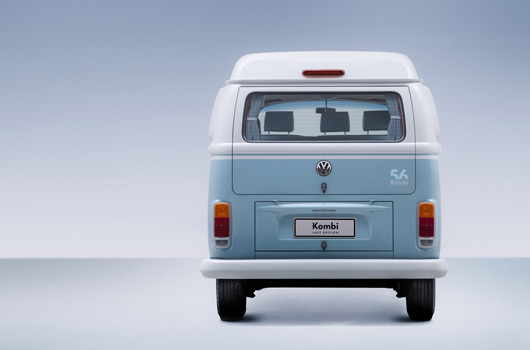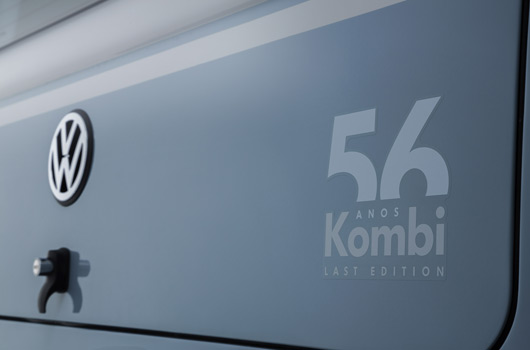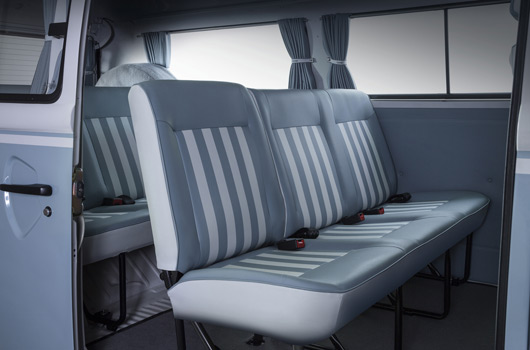The Volkswagen Kombi has been rolling off production lines in Brazil since September 1957. That’s 56 years. That stat makes the Kombi is the most everlasting production model the world has known. And now, due to safety regulations, it’s all about to come to an end.
In honour of the Kombi, or T2 as it is known in various markets, Volkswagen Brazil has created the Kombi Last Edition. Only 600 will be made. All will come with a certificate of authenticity and all will be finished in the two-tone paint scheme you see here.
The Kombi LE is powered by a stonking EA111 1.4-litre engine, which delivers 78PS. That can be boosted to a staggering 80PS if petrol is replaced by ethanol. Power is sent to the driven wheels through a four-speed manual. Remember them!
Like the Beetle, many of us will have a Kombi memory of some sort. Personally, I’m lucky to be here after mum’s Kombi Campervan went up in flames thanks to a faulty gas bottle. We were holidaying and parked in a friends backyard. I was asleep in the Kombi and just five years of age. Apparently they got quite a shock while doing the dishes that night and saw our van on fire!
Riding in the Kombi is one of my earliest automotive memories, along with mum’s Alfa Romeo Spider, and whenever I see a VW bus I can’t help but smile.
Volkswagen launches the Kombi Last Edition to celebrate 56 years of production
- Final edition special series featuring two-tone paint and exclusive design features
- A limited production run of only 600 units; all vehicles will feature a special numbered identification plaque on the dashboard
- Manufactured in Brazil since the 2 September 1957, the Volkswagen Kombi is the longest produced model in automotive history
- Functional design, great cargo capacity and versatility have made the Kombi a huge success
- This commemorative special series will mark the end of Kombi production in Brazil
Volkswagen do Brasil has announced the Kombi Last Edition, a special commemorative series of one of the most successful Volkswagen models in Brazil and the longest produced model in automotive history.
The Kombi Last Edition has a production run of only 600 units and features exclusive body paint, luxury internal finishing and design elements which give a nod to the many versions made in Brazil since 1957.
The Kombi Last Edition comes with special two-tone white and blue body paint and each model will be fitted with a numbered identification plaque on the dashboard. Special design details such as whitewall tyres, white centre wheel caps and tinted rear windows provide an extra touch of nostalgia.
The upper section of the front grille, headlights and indicator rims come in the same colour as the exterior. Front indicator lights feature white crystal lenses. At the side of the vehicle decals help identify the special series: ‘56 anos – Kombi Last Edition’.
Interior – special treatment
Inside, the Volkswagen Kombi Last Edition features distinctive blue fabric curtains in the side and rear windows and curtain fasteners bear the ‘Kombi’ logo, a feature typical of the model’s top versions from the 1960s and 70s.
The seats come in special vinyl upholstery, with sides in Atlanta Blue and a matching two-tone centre (blue and white). The model can seat up to nine people.
The internal side, door and cargo panels are also upholstered in Atlanta Blue vinyl and are finished with decorative stitching. The cabin and luggage area floors are fitted with carpet and dilour Basalto inserts, the same material that covers the spare tyre.
The instrument cluster boasts a special serigraph treatment and keeps the traditional Kombi design of speedometer at the centre and fuel gauge on the right. The MP3 sound system has red LEDs and features auxiliary and USB ports.
Each Kombi Last Edition is provided with a special certificate of authenticity.
The model is equipped with the EA111 1.4-litre engine, which delivers 78 PS when used with petrol or 80 PS when used with ethanol (both at 4.800 rpm). The transmission is a four-speed manual.



